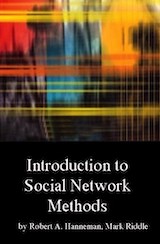
|
FreeComputerBooks.com
Links to Free Computer, Mathematics, Technical Books all over the World
|
|
- Title: Introduction to Social Network Methods
- Author(s) Robert Hannema, Mark Riddle
- Publisher: University of California, Riverside
- Paperback: N/A
- eBook: HTML and PDF Files (3.3 MB)
- Language: English
- ISBN-10: N/A
- ISBN-13: N/A
- Share This:

|
This textbook introduces many of the basics of formal approaches to the analysis of social networks. The text relies heavily on the work of Freeman, Borgatti, and Everett (the authors of the UCINET software package). The materials here, and their organization, were also very strongly influenced by the text of Wasserman and Faust, and by a graduate seminar conducted by Professor Phillip Bonacich at UCLA. Many other users have also made very helpful comments and suggestions based on the first version.
The goal of this book is to provide a very basic introduction to the core ideas of social network analysis, and how these ideas are implemented in the methodologies that many social network analysts use.
About the Authors- Robert Hannema is a professor in the Department of Sociology in the College of Humanities, Arts, and Social Sciences at the University of California, Riverside. He works mostly in statistical and mathematical sociology, social networks, simulation and theory construction, economic, political, and military sociology.
- Social Media and Social Networks
- Big Data
- Project Management
- Professional Careers and Job Interviews
 Similar Books:
Similar Books:
-
 Social Networks with Rich Edge Semantics (Quan Zheng, et al.)
Social Networks with Rich Edge Semantics (Quan Zheng, et al.)
This book introduces a new mechanism for representing social networks in which pairwise relationships can be drawn from a range of realistic possibilities. For each possibility, the book shows how to model the social network using spectral embedding.
-
 Social Networks as the New Frontier of Terrorism (Laura Scaife)
Social Networks as the New Frontier of Terrorism (Laura Scaife)
This book explores how social media adoption by terrorists interacts with privacy law, freedom of expression, data protection and surveillance legislation through an exploration of the fascinating primary resources themselves.
-
 Social Media Mining: An Introduction (Reza Zafarani, et al)
Social Media Mining: An Introduction (Reza Zafarani, et al)
This textbook introduces the unique problems arising from social media data and presents fundamental concepts, emerging issues, and effective algorithms for network analysis and data mining.
-
 Mining Social Media: Finding Stories in Internet Data
Mining Social Media: Finding Stories in Internet Data
This book shows you how to use Python and key data analysis tools to find the stories buried in social media. Perform advanced data analysis using Python, Jupyter Notebooks, and the pandas library.
-
 O'Reilly® Mining the Social Web, 2nd Edition (Matthew A. Russell)
O'Reilly® Mining the Social Web, 2nd Edition (Matthew A. Russell)
This book shows you how to answer these questions like how can you tap into social data and discover who's connecting with whom, which insights are lurking just beneath the surface, and what people are talking about?
-
 Twitter Data Analytics (Shamanth Kumar, et al)
Twitter Data Analytics (Shamanth Kumar, et al)
This book provides methods for harnessing Twitter data to discover solutions to complex inquiries. The brief introduces the process of collecting data through Twitter's APIs and offers strategies for curating large datasets.
-
 Mining the Web: Discovering Knowledge from Hypertext Data
Mining the Web: Discovering Knowledge from Hypertext Data
This is is the first book devoted entirely to techniques for producing knowledge from the vast body of unstructured Web data. Building on an initial survey of infrastructural issues-including Web crawling and indexing.
-
 Mining of Massive Datasets (Jure Leskovec, et al)
Mining of Massive Datasets (Jure Leskovec, et al)
It focuses on practical algorithms that have been used to solve key problems in data mining and can be applied successfully to the largest datasets. It begins with a discussion of the map-reduce framework, an important tool for parallelizing algorithms automatically.
-
 Data Mining for the Masses (Matthew North)
Data Mining for the Masses (Matthew North)
This book uses simple examples, clear explanations and free, powerful, easy-to-use software to teach you the basics of data mining; techniques that can help you answer some of your toughest business questions.
-
 Paths: Why is Life Filled with so many Detours?
Paths: Why is Life Filled with so many Detours?
This book explores the amazing similarity between paths taken by people and many other things in life, and its impact on the way we live, teach and learn. Offering insights into the new scientific field of paths as part of the science of networks, etc.
-
 Why Knowing What To Do Is Not Enough?
Why Knowing What To Do Is Not Enough?
It explains the reasons for the gap between 'knowing' and 'doing', focuses on the role of non-cognitive capacities, such as setting goals, taking action, persevering and coping with setbacks, and shows how these capacities are undermined by adverse circumstances.





